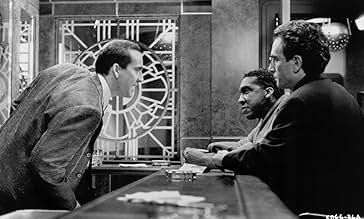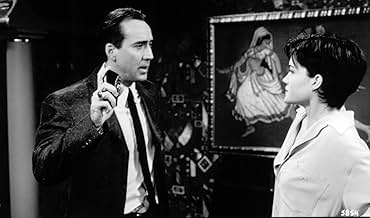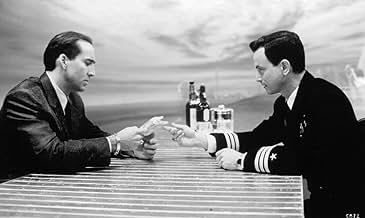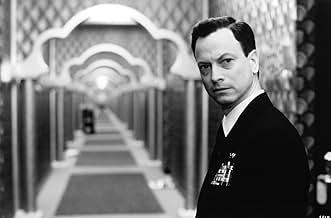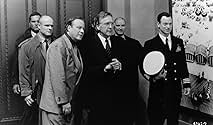IMDb-BEWERTUNG
6,1/10
90.304
IHRE BEWERTUNG
Ein zwielichtiger Polizist befindet sich mitten in einer Mordkomplott bei einem wichtigen Boxkampf in einem Casino in Atlantic City.Ein zwielichtiger Polizist befindet sich mitten in einer Mordkomplott bei einem wichtigen Boxkampf in einem Casino in Atlantic City.Ein zwielichtiger Polizist befindet sich mitten in einer Mordkomplott bei einem wichtigen Boxkampf in einem Casino in Atlantic City.
- Auszeichnungen
- 1 Gewinn & 4 Nominierungen insgesamt
Luis Guzmán
- Cyrus
- (as Luis Guzman)
Empfohlene Bewertungen
I love the awesome camera angles in the same take at different scenes within the movie throughout the boxing match. It feels so professional and some of the scenes are also tracking shots or long takes, but other cameras in the same scene are in close up later and with split screen editing. There's also this awesome camera angle panning as an overhead shot through apartment rooms in another sequence. The payoff of who the lead villian organizing the shootout in the audience is a little underwhelming and the ending credits linger on an outdoor location throughout for no need, but this is mostly so cool and gripping.
Cage is a slick, crooked (and flamboyant) Atlantic City cop with dreams of making it to the big time. While attending a highly publicized boxing match with friend and Naval officer Sinise, he finds himself in the midst of a conspiracy after an important political figure is assassinated, and for the first time he decides to try and complete his job in honest fashion. Stylish but disappointing thriller begins with nifty camera work and has the makings of something really special, but once you get past all the fancy tricks there's really nothing left to hold your interest. Even worse, the film clearly suffers from some last minute edits. **
Overblown, overdirected, overacted: that's why I always enjoy DePalma's movies. He made the statement that the camera lies 24 times a second, and SNAKE EYES plays on that theme.
De Palma's camera is constantly in motion, roaming through the arena, casino , and hotel as if it had a life of its own. At the beginning of the film we watch Nick Santoro (Nicolas Cage) as he swims through the sewer (his words) that is the Atlantic City casino world. He tells us, "This isn't a beach town. It's a sewer. It's my sewer, I am the king."
It's literally a dark and stormy night. A hurricane (a tv reporter is pressured to refer to it as a 'tropical depression' on the air) is coming ashore, and 14,000 people are gathered at a casino complex to watch a prizefight.
There's a shooting during the fight, and Cage orders the exits sealed; who would go outside into a hurricane remains a mystery, but anyhow. There are two mysterious women involved in the incident, and as time passes he realizes that there were lots of people involved, possibly even his longtime friend Navy Commander Dunne (Gary Sinese) who is as straight-arrow as Cage's character is sleazy.
By the end of the story Cage is working toward redemption- even though during the early part of the film it's made clear that he sees everything as having a price.
There's one point where he is offered a million dollars to reveal where one of the women (she knows a lot- too much- about a defense contract, and was talking to the Secretary of Defense when he was shot) is hiding. And there 's a very real chance that he might give in, or be unable to protect her when the danger gets intense.
Men in De Palma's films have a way of failing to come through for women in critical situations. An executive couldn't save his wife in OBSESSION. A young actor couldn't protect a mysterious, beautiful woman in BODY DOUBLE. The nicest guy in school couldn't keep the outcast/prom queen CARRIE from humiliation and its awful consequences. In the superb BLOW OUT a movie soundman rescues a young woman from a sinking car early in the story, but is too late to save her from a madman at the film's conclusion.
So there is no guarantee of a happy ending. Self doubt weighs heavily in De Palma's films, and often people's best efforts are to no avail.
Admittedly David Koepp and De Palma's script is something of a problem. There's a complex conspiracy underfoot, and conspiracies are low on my list of compelling things- I got burned out on them in the seventies.
Far more compelling is the great fun that Cage has with his character. Boy, does he get to chew scenery here. Constantly in motion, talking on his cell phone (even during a hurricane; some of my friends can't use theirs when a cloud passes over the sun), interacting with the low life characters around the casino.
And, oh, does DePalma have fun with the whole thing. Of course, nothing is what it seems to be. He retells the action from the viewpoint of this or that character: we sometimes literally see what happened through that character's eyes. An important setpiece in which we finally see what really happened in clear perspective uses split screen imagery- and in the theatre where we saw SNAKE EYES the use of stereo sound was an integral part of the seperation of images.
For all the bravado of his performance, I was impressed with Cage's ability and willingness to share the screen with other actors. In some of the retellings he is a supporting character or featured extra, and as an actor he's more than willing to let our attention shift to someone else. A lesser actor might have been afraid of that shift of focus. Way to go, Nicolas. That's a real sign of maturity as an actor.
So did I buy into De Palma's bag of tricks? Yup, 100%. It's nice to see a movie that isn't afraid of the old razzle-dazzle. I do appreciate subtlety and complex ideas- that's why I'm a voracious reader. I really don't think I'd enjoy De Palma directing an adaptation of a Jane Austen novel or REMEMBRANCE OF THINGS PAST. The Merchant- Ivory people do that sort of thing so nicely. But it was nice to sit back for an hour and a half and let a master showman use illusion to fool us and let our eyes fool our brains.
On a five scale, Pops gives it four slot machines.
De Palma's camera is constantly in motion, roaming through the arena, casino , and hotel as if it had a life of its own. At the beginning of the film we watch Nick Santoro (Nicolas Cage) as he swims through the sewer (his words) that is the Atlantic City casino world. He tells us, "This isn't a beach town. It's a sewer. It's my sewer, I am the king."
It's literally a dark and stormy night. A hurricane (a tv reporter is pressured to refer to it as a 'tropical depression' on the air) is coming ashore, and 14,000 people are gathered at a casino complex to watch a prizefight.
There's a shooting during the fight, and Cage orders the exits sealed; who would go outside into a hurricane remains a mystery, but anyhow. There are two mysterious women involved in the incident, and as time passes he realizes that there were lots of people involved, possibly even his longtime friend Navy Commander Dunne (Gary Sinese) who is as straight-arrow as Cage's character is sleazy.
By the end of the story Cage is working toward redemption- even though during the early part of the film it's made clear that he sees everything as having a price.
There's one point where he is offered a million dollars to reveal where one of the women (she knows a lot- too much- about a defense contract, and was talking to the Secretary of Defense when he was shot) is hiding. And there 's a very real chance that he might give in, or be unable to protect her when the danger gets intense.
Men in De Palma's films have a way of failing to come through for women in critical situations. An executive couldn't save his wife in OBSESSION. A young actor couldn't protect a mysterious, beautiful woman in BODY DOUBLE. The nicest guy in school couldn't keep the outcast/prom queen CARRIE from humiliation and its awful consequences. In the superb BLOW OUT a movie soundman rescues a young woman from a sinking car early in the story, but is too late to save her from a madman at the film's conclusion.
So there is no guarantee of a happy ending. Self doubt weighs heavily in De Palma's films, and often people's best efforts are to no avail.
Admittedly David Koepp and De Palma's script is something of a problem. There's a complex conspiracy underfoot, and conspiracies are low on my list of compelling things- I got burned out on them in the seventies.
Far more compelling is the great fun that Cage has with his character. Boy, does he get to chew scenery here. Constantly in motion, talking on his cell phone (even during a hurricane; some of my friends can't use theirs when a cloud passes over the sun), interacting with the low life characters around the casino.
And, oh, does DePalma have fun with the whole thing. Of course, nothing is what it seems to be. He retells the action from the viewpoint of this or that character: we sometimes literally see what happened through that character's eyes. An important setpiece in which we finally see what really happened in clear perspective uses split screen imagery- and in the theatre where we saw SNAKE EYES the use of stereo sound was an integral part of the seperation of images.
For all the bravado of his performance, I was impressed with Cage's ability and willingness to share the screen with other actors. In some of the retellings he is a supporting character or featured extra, and as an actor he's more than willing to let our attention shift to someone else. A lesser actor might have been afraid of that shift of focus. Way to go, Nicolas. That's a real sign of maturity as an actor.
So did I buy into De Palma's bag of tricks? Yup, 100%. It's nice to see a movie that isn't afraid of the old razzle-dazzle. I do appreciate subtlety and complex ideas- that's why I'm a voracious reader. I really don't think I'd enjoy De Palma directing an adaptation of a Jane Austen novel or REMEMBRANCE OF THINGS PAST. The Merchant- Ivory people do that sort of thing so nicely. But it was nice to sit back for an hour and a half and let a master showman use illusion to fool us and let our eyes fool our brains.
On a five scale, Pops gives it four slot machines.
I saw this film for the first time the other day, and I was blown away! Not only is the story mysterious and compelling, but the techniques De Palma uses are amazing!
The first 12 and a half minutes is one big shot! That's incredible! And the split-screen sequence is very welcome, simply because the split-screen isn't used enough any more. As my brother, who watched the film with me, said, "The split-screen hasn't been used effectively since Wood-Stock!" I Agree with him. What a great film.
That being said, it isn't De Palma's best. That would probably be The Untouchables.
The first 12 and a half minutes is one big shot! That's incredible! And the split-screen sequence is very welcome, simply because the split-screen isn't used enough any more. As my brother, who watched the film with me, said, "The split-screen hasn't been used effectively since Wood-Stock!" I Agree with him. What a great film.
That being said, it isn't De Palma's best. That would probably be The Untouchables.
1. Is Rick the only cop in Atlantic City?
2. Where did all of the FBI agents go?
3. Did the fat guy get killed in his hotel room?
4. How come those two soldiers who were killed couldn't be trusted but the other dozen people who were involved in the conspiracy could be?
5. Does the Secretary of Defense have final say in regards to how all money in the defense budget will be spent?
6. How did the place clear out so fast of 20,000 fight fans when no one was being allowed out of the building? Were Jack Nicholson and Leonardo DiCaprio there?
7. Do casinos really have 1000 cameras?
8. How come Rick was the only one who could figure out that the champ took a dive when it was clear as day on the videotape? Didn't they watch it on ESPN's Sportcenter?
9. What were those things that looked like missles doing in the basement of a casino in New Jersey?
10. What were Cage, DePalma and the scriptwriter thinking?
2. Where did all of the FBI agents go?
3. Did the fat guy get killed in his hotel room?
4. How come those two soldiers who were killed couldn't be trusted but the other dozen people who were involved in the conspiracy could be?
5. Does the Secretary of Defense have final say in regards to how all money in the defense budget will be spent?
6. How did the place clear out so fast of 20,000 fight fans when no one was being allowed out of the building? Were Jack Nicholson and Leonardo DiCaprio there?
7. Do casinos really have 1000 cameras?
8. How come Rick was the only one who could figure out that the champ took a dive when it was clear as day on the videotape? Didn't they watch it on ESPN's Sportcenter?
9. What were those things that looked like missles doing in the basement of a casino in New Jersey?
10. What were Cage, DePalma and the scriptwriter thinking?
Wusstest du schon
- WissenswertesThe opening 20 minute Steadicam sequence is not really one continuous shot - there are numerous hidden edits. At least 12 minutes of the sequence was done in one take.
- Patzer(at around 26 mins) When Santoro is speaking with Lincoln Tyler in his room for the first time, Lincoln says he was head-butted and there are 2 butterfly stitches on his right eye brow. When he sends everyone out of the room you can clearly see that Lincoln now has 3 butterfly stitches on his right eyebrow while talking with Santoro.
- Zitate
Commander Kevin Dunne: How's Angela?
Rick Santoro: Fat, fabulous, fantastic--I love her.
Commander Kevin Dunne: How's the other one--what's her name? Candy?
Rick Santoro: Oh, Monique? Skinny, mean, expensive--I *LOVE* her!
- Crazy CreditsThe end credits scroll over a construction site scene (presumably the new casino), closing in tighter and tighter until the final shot is of a bright red jewel embedded in a concrete pillar that the workmen are installing. Most of the time the jewel is hidden under the hand of one of the workers. The ring was worn by the red-haired woman/Navy agent who was part of Commander Kevin Dunn's scheme.
- SoundtracksFiesta Mexicana
Written and Performed by Rick Rhodes (as Rhodes), Chieli Minucci (as Minucci) & Steve Skinner (as Skinner)
Courtesy of Zomba Music Services
Top-Auswahl
Melde dich zum Bewerten an und greife auf die Watchlist für personalisierte Empfehlungen zu.
- How long is Snake Eyes?Powered by Alexa
Details
- Erscheinungsdatum
- Herkunftsländer
- Sprachen
- Auch bekannt als
- Ojos de serpiente
- Drehorte
- Montreal Forum - 2313 Saint-Catherine Street W, Montreal, Québec, Kanada(Atlantic City Arena)
- Produktionsfirmen
- Weitere beteiligte Unternehmen bei IMDbPro anzeigen
Box Office
- Budget
- 73.000.000 $ (geschätzt)
- Bruttoertrag in den USA und Kanada
- 55.591.409 $
- Eröffnungswochenende in den USA und in Kanada
- 16.310.373 $
- 9. Aug. 1998
- Weltweiter Bruttoertrag
- 103.891.409 $
- Laufzeit
- 1 Std. 38 Min.(98 min)
- Farbe
- Sound-Mix
- Seitenverhältnis
- 2.39 : 1
Zu dieser Seite beitragen
Bearbeitung vorschlagen oder fehlenden Inhalt hinzufügen


